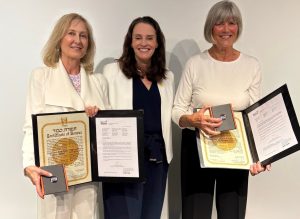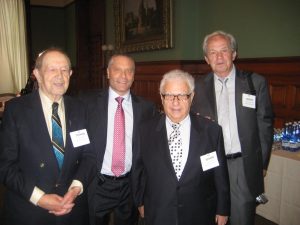As the Allied forces pushed the Germans north through Italy and ousted them from other parts of Europe during 1944 and 1945, many Canadian Jewish servicemen and women would come face-to-face with the truth about the fate of the continent’s Jews. For the Canadian Jews in uniform, liberation was an experience of exhilaration mixed with despair and a strong sense of responsibility.
Irving Schreiber, a Canadian signaller, didn’t have much information to go on when his unit arrived in liberated Brussels in September 1944. All he had was a letter containing an old address where a Jewish family had been in hiding since the Nazi invasion of Belgium in 1940. He was looking for the Nussbaums, originally from Wanne-Eickel, in northwestern Germany. Their eldest son, Walter, had been sent to safety in Holland and then to England right after Kristallnacht in November 1938; he was later deported to Canada by the British as an enemy alien. Walter knew that his parents and two sisters had made it out of Germany to Brussels, but he hadn’t heard from them in four years.
READ: THE ROLE OF CANADIAN SOLDIERS IN THE SECOND WORLD WAR
Schreiber’s younger brother, Bill, worked in the same suit factory as Walter on Pine Avenue in Montreal. The teenage Schreiber promised to write to Irving and ask him to search. It took about a month for Irving to find them. Walter’s parents, Yitzhak and Rose, and a younger sister, Edith, were still alive. Right after Kristallnacht, they had made it across the German border thanks to secret arrangements involving a taxi ride into Belgium, a rendezvous at a restaurant and a long journey by foot to Brussels. Edith, who was 10 at the time, was tucked away in a monastery with the nuns. Walter’s older sister, Senta, however, was later caught in the streets in 1942 and deported to Auschwitz.
When Irving Schreiber found the family, the Nussbaums were overjoyed to learn that their now 20-year-old son, Walter, whom they had last seen when he was 14, was safe. Schreiber’s unit spent five weeks in Brussels, and during that time he brought food and supplies to the Nussbaums, including gum and chocolates for Edith. He tucked their letters to Walter into his army mail home.
This search for the survivors is what the chaplain Rabbi Sam Cass would later describe as “the great hunt.” Canadian Jewish military personnel often took on these heartfelt unofficial missions to help desperate relatives look for traces of their families. Estelle Aspler’s (née Tritt) mother used to send her names and addresses on behalf of people who knew that the Canadian Army nurse was serving overseas. What Aspler often found was absence and grief. She reconnected one Jewish girl in California with surviving family in Europe, tracking down a sister in unoccupied France. The father was missing, but she found the mother at a Salvation Army hostel in Amsterdam. “I went in to see the mother. When she came in I couldn’t help thinking, ‘There but for the grace of God, goes my mother.’ ”
No one asked Hy Chud to comfort the Jewish survivors in Utrecht, Netherlands. Yet when the 7th Reconnaissance Regiment passed through the liberated Dutch city in May 1945, Chud swung into action. “The first thing all the Jewish guys did was ask, ‘Are there any Jews around?’ and ‘Was there a synagogue?’ ” Chud said. He was told about a Jewish woman who was living with some nuns. He located the convent and met the mother superior, who agreed to introduce the Canadian Jewish soldier to her guest. Speaking to him in Yiddish, the survivor told him that her husband had been deported and she’d gone into hiding. The two embraced, then Chud asked if he could have her hated yellow Star of David badge. His army friends advised him to get rid of the woman’s yellow badge, thinking it might be a dangerous souvenir to have, but he still has it.
Armbands figured prominently in the encounter that the Toronto soldier Reuben Cherry had with a family of Dutch Jewish survivors. In mid-April 1945, Cherry’s unit, the 48th Highlanders, was clearing the way toward Apeldoorn, Netherlands. They went house to house searching for Germans. Cherry heard a noise in one of the rooms. “Come out,” he called out in English. From behind the wall stepped a father, mother and two children.
“He gave them food, and they were wearing those armbands,” said Murray Jacobs, who came by later and met the family. “They were sharing whatever food we had with us. Like hard biscuits, you know, things (like) that; they were starving.” When the family was ready to leave its hiding place and move elsewhere, Jacobs provided them with rations. Cherry urged them to remove their offensive armbands. The Dutch woman wrote down the story of what had happened to them and gave the document and one of the armbands to Cherry.
Sometimes the liberation involved a soldier’s own family, as was the case for Max (Val) Rimer. The Winnipeg resident, who admits he initially enlisted in the army at 19 for adventure, saw action in Italy, Belgium and Holland. At the end of the war, Rimer went on his own “great hunt” for some lost relatives. Before he was shipped home in 1946, he made his way to the town of Valenciennes on the French-Belgian border where his father’s sister had lived. He found the town mostly destroyed, first by German bombs in 1940 and then by a fire. Over 500 local Jews had been deported to Auschwitz in 1942.
Rimer’s aunt had survived. She didn’t know what to make of the young Canadian soldier. Rimer didn’t speak French. She didn’t speak English. He tried Yiddish. “I said to her in Jewish, ‘I’m Jack’s son,’ ” Rimer said. She started to cry. His aunt brought him into the kitchen and told him his uncle had been killed in the Holocaust. She was raising their five children, his cousins, alone. “I left everything I could for them,” Rimer said. His family eventually brought them to live in Canada.
Many of the survivors Herb Ludman encountered eventually went to Palestine. The Canadian airman was serving as a navigator with a Royal Air Force squadron in Foggia, Italy, and when he wasn’t flying missions, Ludman teamed up with other Jewish service personnel, including some from the Jewish Brigade. They provided shelter for displaced Jewish persons who had nowhere to go. “We all got together with some American-Jewish servicemen and bought several Italian farms where we brought all the children from the camps,” Ludman reported. On his days off, he would forage around the Italian countryside, collecting supplies for his charges. All the children would eventually be sent to live in Palestine.
The encounters with survivors could be traumatic for the Canadian liberators. Lorne Winer and his friend John Woodrow attended a Canadian-led memorial service for Allied Jewish soldiers who had been killed in Normandy. The event was being held near a Jewish cemetery in the ruins of Caen, France. Winer said that Rabbi David Monson gathered the men in the only building left standing. Memorial candles were lit and Winer and Woodrow joined a group of heavily armed Jewish-American paratroopers in reciting the prayers. “Five minutes into the service we began to hear a moaning sound,” Winer said, describing the noise coming from a “couple of dozen” Jewish survivors who had stepped out from behind a wall. They had been in hiding for five years and were stunned, but also thrilled, to see so many armed Jewish servicemen praying. “They looked like wraiths, ghosts standing against the wall. And they were moaning partly in elation.”
Winer experienced “surreal” feelings at the service, but these certainly weren’t the only emotions that Jewish Canadian personnel had in response to the liberation. Some reacted with anger. “I hated every German I saw, whether it was right or wrong,” admitted Calgary’s Mel Polsky, with the Royal Canadian Corps of Signals. “You can’t shoot at them and be shot at by them for six years and then become friendly.” He especially hated those Germans who said they didn’t know what was happening to Jews.
When Ruben Ostfield was shipped back to Canada from England for officers training in February 1943, a group of German prisoners of war was on board the same ship, en route to POW camps in Canada. “My father was required to do guard duty. He once told me that he was hard-pressed not to shoot some of them because of the plight of Jews in Europe,” Michael Ostfield said.
Lawrence Levy’s artillery unit were the first troops to enter liberated Elbeuf, France, in August 1944. He was thrilled with the welcome that the Canadians received but remembers seeing how the newly freed French heaped vengeance on those residents who had helped the Germans. “They were cutting the hair off the women collaborators,” Levy said, adding that those who had slept with German soldiers were then forced to parade through the streets naked. The men who had collaborated were being shot. “Nobody stopped it,” Levy said.
In Holland, Norman Gulko’s unit would come across scores of retreating or captured German soldiers. Gulko yelled out at them. “ ‘Er komt de Herrenvolk! Here come the Supermen!’ I never felt so proud as a Jew, as a Canadian. Whether they heard it or cared, I just felt tremendous,” Gulko said. Trooper Val Rimer admitted doing something similar. He hurled his anger at the prisoners. Rimer recounted the episode for War Story, a documentary on the History Channel. “I was yelling at them. I didn’t touch them, I knew better than that, but I was screaming,” Rimer said. “I was shouting to them that ‘I’m a Jude, I’m Jewish. I want you to know that there’s a Jewish person here that helped end this war.’ ”
Excerpted from Double Threat: Canadian Jews, the Military, and World War II by Ellin Bessner, published by New Jewish Press, Anne Tanenbaum Centre for Jewish Studies, University of Toronto.
Author

Ellin is a journalist and author who has worked for CTV News, CBC News, The Canadian Press and JazzFM. She authored the book Double Threat: Canadian Jews, the Military and WWII (2019) and contributed to Northern Lights: A Canadian Jewish History (2020). Currently a resident of Richmond Hill, Ont., she is a fan of Outlander, gardening, birdwatching and the Toronto Maple Leafs. Contact her at [email protected].
View all posts







